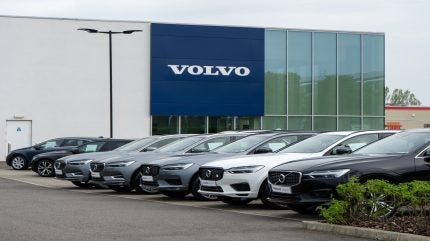
Volvo Cars has reported a core operating profit (EBIT), excluding joint ventures and associates, of Sgkr5.7bn ($539.36m) for the third quarter of 2024, a decline of 6.5% compared with Sgkr6.1bn ($577.12bn) in the year ago period.
Gross margins came in at 20.5% for the third quarter, broadly in line with the company’s underlying operational gross margins for the first half of 2024.

Discover B2B Marketing That Performs
Combine business intelligence and editorial excellence to reach engaged professionals across 36 leading media platforms.
Revenues for the period amounted to Sgkr93bn and the EBIT margin landed at 6.2%.
Volvo Cars said it aims to outgrow the premium car market and generate a core EBIT margin of 7-8% as well as strong free cash flows from 2026 onwards.
Volvo Cars CEO Jim Rowan said: “Our journey towards 2026 will not be linear, as our industry is facing an increasingly volatile environment. Macroeconomic headwinds are intensifying, as is geopolitical complexity.
“Despite these challenges we demonstrated resilience during the third quarter of 2024, which is reflected in our overall financial performance.”
Volvo Cars’s third quarter sales rose by 3 %to 172,849 cars sold, with electrified models (fully electric and plug-in hybrid cars) representing 48 %of the total.
Volvo Cars claimed that its electrified share was the highest for the premium car industry in Europe.
For the first nine months of 2024, Volvo Cars sales increased by 10 %year-on-year.
In Europe, Volvo Cars increased its market share to 2.4% during the quarter, from 1.7 %in the same period last year.
However, the car market in the company’s main regions of Europe, China and the US is increasingly under pressure which affects demand.
Given this accelerating weakness in the market and Volvo Cars’ focus on safeguarding value over volume, the company expects minimal volume growth during the fourth quarter.
As a result, it now anticipates full-year sales growth of 7-8%, instead of its earlier forecast of 12-15%.
The company noted that it is investing in new technologies, infrastructure, and vehicles to become a leader in next-generation mobility. Volvo Cars expects these investments to peak in 2024-25, with strong free cash flows anticipated from 2026 onward.
Rowan added: “We cannot control the current geopolitical uncertainties and economic headwinds. But we can navigate them with speed, purpose, and a clear focus. Our focus is more than ever on preserving cash while creating value – for our shareholders, customers and employees.
“We have proven before that we can handle challenges, and we will handle them again. Business is not a game of perfection, it is a game of progress. And despite current challenges, Volvo Cars is making progress. This is shown in our results, our technology, our talent, and ultimately our cars.”






